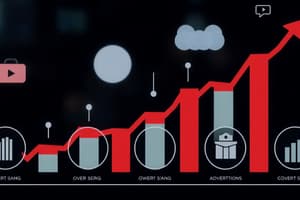Podcast
Questions and Answers
What is a key element in digital marketing strategies that helps maximize ROI?
What is a key element in digital marketing strategies that helps maximize ROI?
- Traditional advertising methods
- High spending on ads
- Focusing solely on social media
- Target audience identification (correct)
Which of the following is NOT a benefit of social media advertising?
Which of the following is NOT a benefit of social media advertising?
- Guaranteed immediate sales (correct)
- Cost-effective compared to traditional advertising
- Higher engagement rates
- Increased brand visibility
What is the purpose of on-page optimization in SEO?
What is the purpose of on-page optimization in SEO?
- Attract social media followers
- Increase website speed
- Build backlinks
- Enhance content quality and meta tags (correct)
How does effective content marketing enhance ROI?
How does effective content marketing enhance ROI?
Which strategy is commonly used in social media advertising to optimize ad performance?
Which strategy is commonly used in social media advertising to optimize ad performance?
What is a key component of technical SEO?
What is a key component of technical SEO?
Which type of content is most effective for content marketing?
Which type of content is most effective for content marketing?
What is the goal of keyword research in SEO?
What is the goal of keyword research in SEO?
Study Notes
ROI Improvement
Digital Marketing Strategies
- Definition: Techniques to enhance the effectiveness of marketing efforts and maximize return on investment (ROI).
- Key Elements:
- Target audience identification
- Multi-channel approach (email, social media, SEO)
- Data analytics for performance tracking
- Budget allocation based on channel effectiveness
Social Media Advertising
- Benefits:
- Increased brand visibility
- Targeted advertising options (demographics, interests)
- Cost-effective compared to traditional advertising
- Strategies:
- Utilize engaging visuals and videos
- Implement A/B testing to optimize ads
- Leverage user-generated content for authenticity
- Monitor and adjust campaigns using analytics tools
Search Engine Optimization (SEO)
- Purpose: Improve website visibility in search engine results to attract organic traffic.
- Key Components:
- Keyword research to identify high-value terms
- On-page optimization (meta tags, headers, content quality)
- Off-page strategies (link building, social signals)
- Technical SEO (site speed, mobile-friendliness)
- Impact on ROI: Higher organic traffic leads to lower acquisition costs and better conversion rates.
Content Marketing
- Objective: Create valuable content to attract and retain a target audience, ultimately driving profitable customer action.
- Types of Content:
- Blog posts, videos, infographics, ebooks
- Case studies and white papers
- Strategies:
- Focus on storytelling and brand messaging
- Regularly update and repurpose existing content
- Use SEO techniques to increase content visibility
- Measure engagement metrics (shares, comments, conversions) to assess effectiveness
- ROI Enhancement: Effective content marketing builds trust, educates customers, and fosters long-term relationships, leading to increased sales.
ROI Improvement
Digital Marketing Strategies
- Enhance marketing effectiveness and maximize ROI through various techniques.
- Critical to identify the target audience for tailored messaging.
- Employ a multi-channel approach, integrating email, social media, and SEO efforts.
- Utilize data analytics to track performance and inform strategy adjustments.
- Allocate budget effectively, focusing on the best-performing channels.
Social Media Advertising
- Increases brand visibility and awareness among potential customers.
- Offers targeted advertising options based on demographics and personal interests.
- More cost-effective than traditional advertising modalities.
- Incorporate engaging visuals and videos to captivate the audience.
- Apply A/B testing for continuous ad optimization and performance evaluation.
- User-generated content boosts authenticity and fosters community engagement.
- Utilize analytics tools to monitor campaign performance and make data-driven adjustments.
Search Engine Optimization (SEO)
- Aims to enhance website visibility in search engine results, leading to increased organic traffic.
- Conduct thorough keyword research to target high-traffic, high-value search terms.
- Implement on-page optimization techniques, including meta tags, headers, and quality content.
- Engage in off-page strategies like link building and enhancing social signals.
- Focus on technical aspects of SEO, such as site speed and ensuring mobile-friendliness.
- Improved organic traffic results in lower customer acquisition costs and higher conversion rates.
Content Marketing
- Focuses on creating valuable, relevant content to attract and retain a specific audience.
- Types of content include blog posts, videos, infographics, ebooks, case studies, and white papers.
- Emphasize storytelling and a cohesive brand message in content creation.
- Regularly refresh and repurpose existing content to maintain relevance and engagement.
- Apply SEO methods to enhance content visibility and reach larger audiences.
- Track engagement metrics like shares, comments, and conversions to evaluate content effectiveness.
- Strong content marketing cultivates trust, educates consumers, and builds long-term customer relationships, ultimately increasing sales.
Studying That Suits You
Use AI to generate personalized quizzes and flashcards to suit your learning preferences.
Description
Explore effective digital marketing strategies aimed at enhancing your return on investment (ROI). This quiz covers key elements such as audience targeting, multi-channel approaches, data analytics, and social media advertising benefits. Test your knowledge on how to allocate budgets and measure performance effectively.




